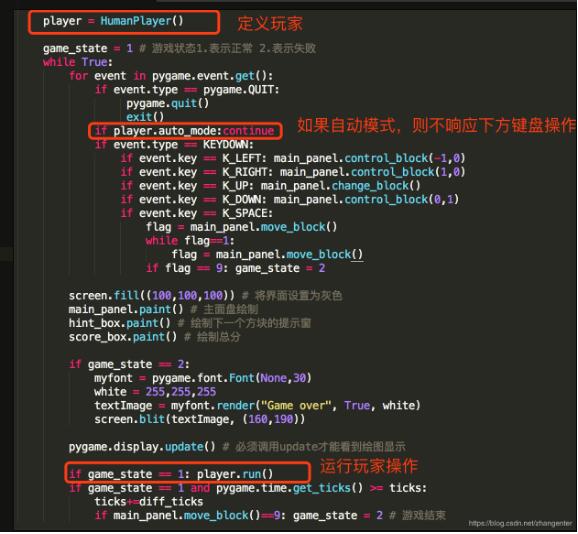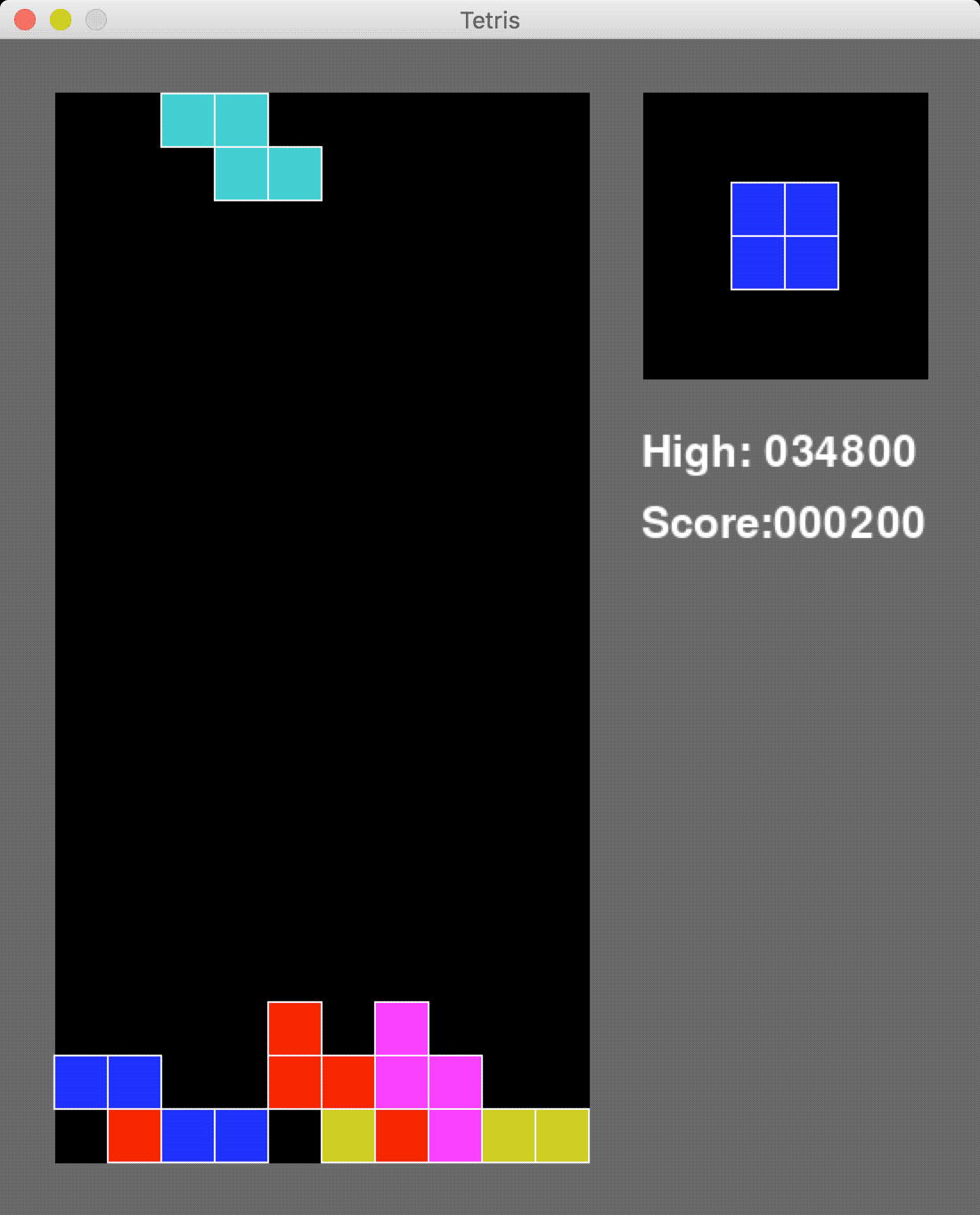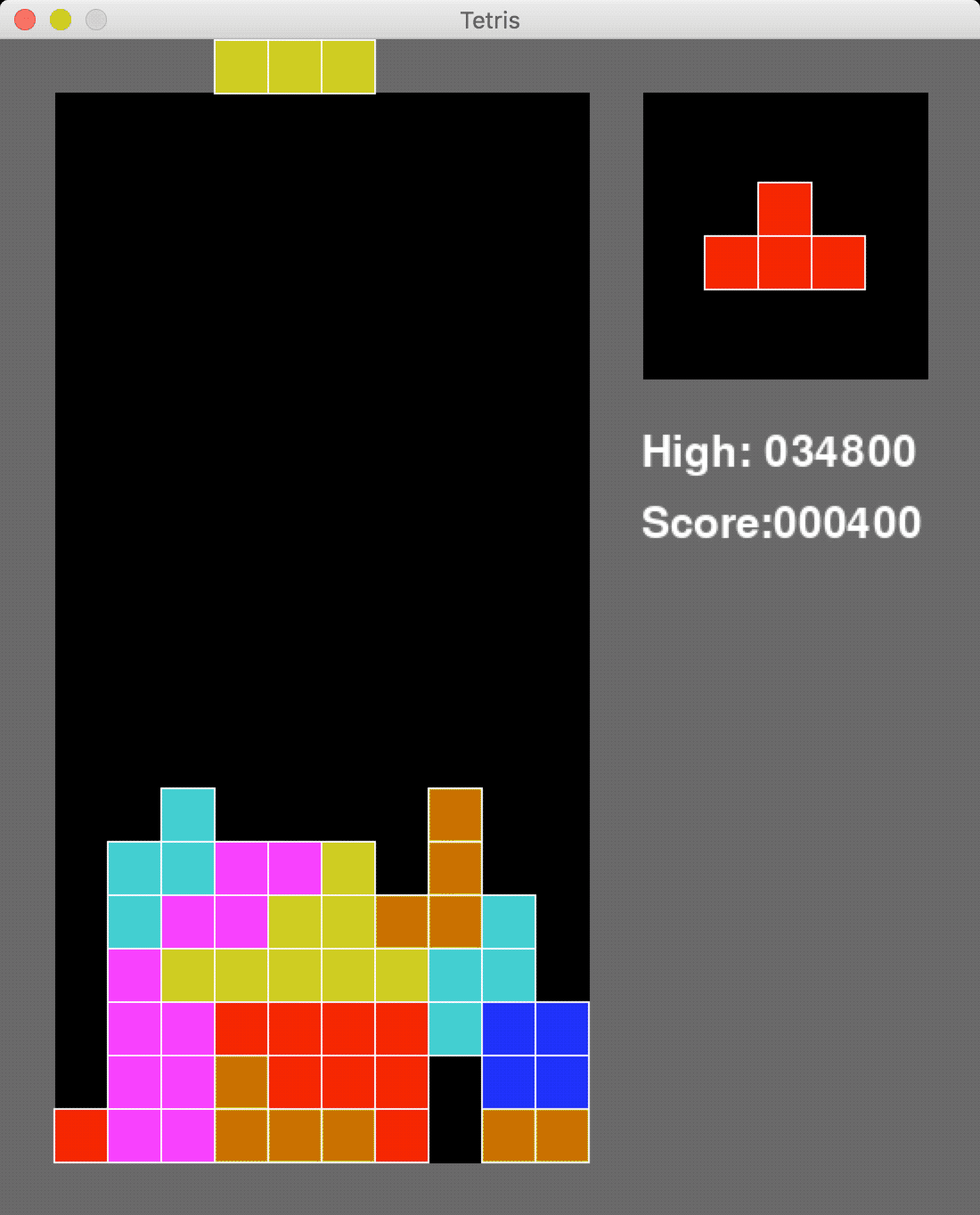pygame实现俄罗斯方块游戏(AI篇1)
上次更新到pygame实现俄罗斯方块游戏(基础篇3)
现在继续
一、定义玩家类
定义玩家类是为了便于进行手动和机器模式或各种不同机器人模式的混合使用,增加代码扩展性。
可以先定义一个玩家基类
class Player(object): auto_mode=False # 是否是自动模式,自动模式应当不响应键盘操作 def __init__(self): pass def run(self): # 进行操作 pass
手动类和机器类继承自Player类
class HumanPlayer(Player): def __init__(self): super(Player, self).__init__() class AIPlayer(Player): auto_mode=True def __init__(self): super(Player, self).__init__() def run(self): pass
下面然后游戏代码中做下面三处修改

好了,现在玩家类添加完毕,由于HumanPlayer类的run执行的是pass,原来的操作没有受到影响,下面该去实现AIPlayer的run了
二、贪心计算
方块有N种形态,每种形态有若干种水平位置,假设AI只管方块变形和移动能落得最低位置,越低越好。
首先,我们要将当前游戏界面的方块情况告诉玩家,所以我们在Player类的run函数增加一下panel参数,将panel作为run的参数传入。
AIPlayer的代码大致改成下面这样
class AIPlayer(Player): cal_block_id=-1 # 用于判断是否方块发生了变化 ctl_arr=[] # 存:1=变、2=左、3=右、4=下,这些数 auto_mode=True def __init__(self): super(Player, self).__init__() def run(self, panel): if panel.block_id == self.cal_block_id: # block_id没变,按原来计算好的操作规则进行 if len(ctl_arr)>0: ctl = self.ctl_arr.pop(0) if ctl == 1: panel.change_block() if ctl == 2: panel.control_block(-1,0) if ctl == 3: panel.control_block(1,0) if ctl == 4: flag = panel.move_block() while flag==1: flag = panel.move_block() if flag == 9: game_state = 2 else: # block_id变了,计算新方块的操作规则 self.cal_block_id = panel.block_id matrix = panel.get_rect_matrix() #matrix.print_matrix() # print for debug # # 添加计算操作的逻辑 # pass
这里为了方便计算将panel中rect_arr转成matrix,一般建议matrix用numpy的,这边的使用场景比较简单,就不增加依赖包了,自己实现一个简单的matrix
class Matrix(object): rows = 0 cols = 0 data = [] def __init__(self, rows, cols): self.rows = rows self.cols = cols self.data = [0 for i in range(rows*cols)] def set_val(self, x, y, val): self.data[y*self.cols+x] = val def get_val(self, x, y): return self.data[y*cols+x] def print_matrix(self): for i in range(self.rows): print self.data[self.cols*i:self.cols*(i+1)]
panel的get_rect_matrix是这么实现的
def get_rect_matrix(self): matrix = Matrix(ROW_COUNT, COL_COUNT) for rect_info in self.rect_arr: matrix.set_val(rect_info.x, rect_info.y, 1) return matrix
为获取不同形态的值,Block类和子类的get_shape函数稍作修改,增加一个输入
class TBlock(Block): # 四种形态 shape_id=0 shape_num=4 def __init__(self, n=None): super(TBlock, self).__init__() if n is None: n=random.randint(0,3) self.shape_id=n self.rect_arr=self.get_shape() self.color=(255,0,0) def get_shape(self, sid=None): if sid is None: sid = self.shape_id if sid==0: return [(0,1),(1,1),(2,1),(1,2)] elif sid==1: return [(1,0),(1,1),(1,2),(0,1)] elif sid==2: return [(0,1),(1,1),(2,1),(1,0)] else: return [(1,0),(1,1),(1,2),(2,1)]
计算最优操作的代码如下,大致思路是落下的四个方块的Y值加起来越大越好
def cal_best_arr(self, panel): matrix = panel.get_rect_matrix() #matrix.print_matrix() # print for debug cur_shape_id = panel.moving_block.shape_id shape_num = panel.moving_block.shape_num max_score = 0 best_arr = [] for i in range(shape_num): tmp_shape_id = cur_shape_id + i if tmp_shape_id >= shape_num: tmp_shape_id = tmp_shape_id % shape_num tmp_shape = panel.moving_block.get_shape(sid=tmp_shape_id) center_shape = [] for x,y in tmp_shape: center_shape.append((x+COL_COUNT/2-2,y-2)) minx = COL_COUNT maxx = 0 miny = ROW_COUNT maxy = -2 for x,y in center_shape: if x<minx: minx = x if x>maxx: maxx = x if y<miny: miny = y if y>maxy: maxy = y for xdiff in range(-minx,COL_COUNT-maxx): # 左右可以移动的范围 arr = [1 for _ in range(i)] if xdiff < 0: [arr.append(2) for _ in range(-xdiff)] if xdiff > 0: [arr.append(3) for _ in range(xdiff)] arr.append(4) for yindex in range(-miny, ROW_COUNT-maxy): # 往下检测碰撞 if matrix.cross_block(center_shape, xdiff=xdiff, ydiff=yindex): break score = sum([y+yindex for x,y in center_shape]) #print i,xdiff,yindex,score if score > max_score: max_score = score best_arr = arr self.ctl_arr = best_arr

大概的AI效果有了,但是发现它还不会考虑造成空洞的影响,下面还要继续优化
三、空洞的惩罚
Matrix类加一个获取空洞数的函数,这里先简单定义为上方有方块为空洞
def get_hole_number(self): hole_num=0 for x in range(0,self.cols): for y in range(1,self.rows): if self.get_val(x,y) == 0 and self.get_val(x,y-1) == 1: # 上方有方块的当成空洞 #print x,y hole_num+=1 return hole_num
计算最佳操作的函数加入空洞的惩罚值修改如下
def cal_best_arr(self, panel): matrix = panel.get_rect_matrix() cur_shape_id = panel.moving_block.shape_id shape_num = panel.moving_block.shape_num max_score = -10000 best_arr = [] for i in range(shape_num): tmp_shape_id = cur_shape_id + i if tmp_shape_id >= shape_num: tmp_shape_id = tmp_shape_id % shape_num tmp_shape = panel.moving_block.get_shape(sid=tmp_shape_id) center_shape = [] for x,y in tmp_shape: center_shape.append((x+COL_COUNT/2-2,y-2)) minx = COL_COUNT maxx = 0 miny = ROW_COUNT maxy = -2 for x,y in center_shape: if x<minx: minx = x if x>maxx: maxx = x if y<miny: miny = y if y>maxy: maxy = y for xdiff in range(-minx,COL_COUNT-maxx): # 左右可以移动的范围 arr = [1 for _ in range(i)] if xdiff < 0: [arr.append(2) for _ in range(-xdiff)] if xdiff > 0: [arr.append(3) for _ in range(xdiff)] max_yindex = -miny for yindex in range(-miny, ROW_COUNT-maxy): # 往下检测碰撞 if matrix.cross_block(center_shape, xdiff=xdiff, ydiff=yindex): break max_yindex = yindex score = sum([y+max_yindex for x,y in center_shape]) # 克隆矩阵并且将方块落下,便于计算落下后的空洞数 clone_matrix = matrix.clone() clone_matrix.fill_block(center_shape, xdiff=xdiff, ydiff=max_yindex) score -= clone_matrix.get_hole_number() * COL_COUNT if score > max_score: max_score = score best_arr = arr self.ctl_arr = best_arr+[4]

现在AI的表现正常一些了,先优化到这,下章继续,下面继续贴下目前的完整代码
# -*- coding=utf-8 -*-
import random
import pygame
from pygame.locals import KEYDOWN,K_LEFT,K_RIGHT,K_UP,K_DOWN,K_SPACE
import pickle,os
ROW_COUNT=20
COL_COUNT=10
SCORE_MAP=(100,300,800,1600)
class Matrix(object):
rows = 0
cols = 0
data = []
def __init__(self, rows, cols, data=None):
self.rows = rows
self.cols = cols
if data is None: data = [0 for i in range(rows*cols)]
self.data = data
def set_val(self, x, y, val):
self.data[y*self.cols+x] = val
def get_val(self, x, y):
return self.data[y*self.cols+x]
def cross_block(self, rect_arr, xdiff=0, ydiff=0):
for x,y in rect_arr:
#if x+xdiff>=0 and x+xdiff<self.cols and y+ydiff>=0 and y+ydiff<self.rows:
if self.get_val(x+xdiff,y+ydiff) == 1: return True
return False
def get_hole_number(self):
hole_num=0
for x in range(0,self.cols):
for y in range(1,self.rows):
if self.get_val(x,y) == 0 and self.get_val(x,y-1) == 1: # 上方有方块的当成空洞
#print x,y
hole_num+=1
return hole_num
def clone(self):
clone_matrix=Matrix(self.rows, self.cols, list(self.data))
return clone_matrix
def fill_block(self, rect_arr, xdiff=0, ydiff=0):
for x,y in rect_arr:
self.set_val(x+xdiff,y+ydiff, 1)
def print_matrix(self):
for i in range(self.rows):
print self.data[self.cols*i:self.cols*(i+1)]
class Player(object):
auto_mode=False # 是否是自动模式,自动模式应当不响应键盘操作
def __init__(self):
pass
def run(self, panel): # 进行操作
pass
class HumanPlayer(Player):
def __init__(self):
super(Player, self).__init__()
class AIPlayer(Player):
cal_block_id=-1 # 用于判断是否方块发生了变化
ctl_arr=[] # 存:1=变、2=左、3=右、4=下,这些数
auto_mode=True
ai_diff_ticks = 1 # 移动一次的时间,单位毫秒
def __init__(self):
super(Player, self).__init__()
self.ctl_ticks = pygame.time.get_ticks() + self.ai_diff_ticks
def cal_best_arr(self, panel):
matrix = panel.get_rect_matrix()
cur_shape_id = panel.moving_block.shape_id
shape_num = panel.moving_block.shape_num
max_score = -10000
best_arr = []
for i in range(shape_num):
tmp_shape_id = cur_shape_id + i
if tmp_shape_id >= shape_num: tmp_shape_id = tmp_shape_id % shape_num
tmp_shape = panel.moving_block.get_shape(sid=tmp_shape_id)
center_shape = []
for x,y in tmp_shape: center_shape.append((x+COL_COUNT/2-2,y-2))
minx = COL_COUNT
maxx = 0
miny = ROW_COUNT
maxy = -2
for x,y in center_shape:
if x<minx: minx = x
if x>maxx: maxx = x
if y<miny: miny = y
if y>maxy: maxy = y
for xdiff in range(-minx,COL_COUNT-maxx): # 左右可以移动的范围
arr = [1 for _ in range(i)]
if xdiff < 0: [arr.append(2) for _ in range(-xdiff)]
if xdiff > 0: [arr.append(3) for _ in range(xdiff)]
max_yindex = -miny
for yindex in range(-miny, ROW_COUNT-maxy): # 往下检测碰撞
if matrix.cross_block(center_shape, xdiff=xdiff, ydiff=yindex):
break
max_yindex = yindex
score = sum([y+max_yindex for x,y in center_shape])
# 克隆矩阵并且将方块落下,便于计算落下后的空洞数
clone_matrix = matrix.clone()
clone_matrix.fill_block(center_shape, xdiff=xdiff, ydiff=max_yindex)
score -= clone_matrix.get_hole_number() * COL_COUNT
if score > max_score:
max_score = score
best_arr = arr
self.ctl_arr = best_arr+[4]
def run(self, panel):
if pygame.time.get_ticks() < self.ctl_ticks: return
self.ctl_ticks += self.ai_diff_ticks
if panel.block_id == self.cal_block_id: # block_id没变,按原来计算好的操作规则进行
if len(self.ctl_arr)>0:
ctl = self.ctl_arr.pop(0)
if ctl == 1: panel.change_block()
if ctl == 2: panel.control_block(-1,0)
if ctl == 3: panel.control_block(1,0)
if ctl == 4:
flag = panel.move_block()
while flag==1:
flag = panel.move_block()
else: # block_id变了,计算新方块的操作规则
self.cal_block_id = panel.block_id
self.cal_best_arr(panel)
class RectInfo(object):
def __init__(self, x, y, color):
self.x = x
self.y = y
self.color = color
class HintBox(object):
next_block=None
def __init__(self, bg, block_size, position):
self._bg=bg;
self._x,self._y,self._width,self._height=position
self._block_size=block_size
self._bgcolor=[0,0,0]
def take_block(self):
block = self.next_block
if block is None: # 如果还没有方块,先产生一个
block = create_block()
self.next_block = create_block() # 产生下一个方块
return block
def paint(self):
mid_x=self._x+self._width/2
pygame.draw.line(self._bg,self._bgcolor,[mid_x,self._y],[mid_x,self._y+self._height],self._width)
bz=self._block_size
# 绘制正在落下的方块
if self.next_block:
arr = self.next_block.get_rect_arr()
minx,miny=arr[0]
maxx,maxy=arr[0]
for x,y in arr:
if x<minx: minx=x
if x>maxx: maxx=x
if y<miny: miny=y
if y>maxy: maxy=y
w=(maxx-minx)*bz
h=(maxy-miny)*bz
# 计算使方块绘制在提示窗中心位置所需要的偏移像素
cx=self._width/2-w/2-minx*bz-bz/2
cy=self._height/2-h/2-miny*bz-bz/2
for rect in arr:
x,y=rect
pygame.draw.line(self._bg,self.next_block.color,[self._x+x*bz+cx+bz/2,self._y+cy+y*bz],[self._x+x*bz+cx+bz/2,self._y+cy+(y+1)*bz],bz)
pygame.draw.rect(self._bg,[255,255,255],[self._x+x*bz+cx,self._y+y*bz+cy,bz+1,bz+1],1)
class ScoreBox(object):
total_score = 0
high_score = 0
db_file = 'tetris.db'
def __init__(self, bg, block_size, position):
self._bg=bg;
self._x,self._y,self._width,self._height=position
self._block_size=block_size
self._bgcolor=[0,0,0]
if os.path.exists(self.db_file): self.high_score = pickle.load(open(self.db_file,'rb'))
def paint(self):
myfont = pygame.font.Font(None,36)
white = 255,255,255
textImage = myfont.render('High: %06d'%(self.high_score), True, white)
self._bg.blit(textImage, (self._x,self._y))
textImage = myfont.render('Score:%06d'%(self.total_score), True, white)
self._bg.blit(textImage, (self._x,self._y+40))
def add_score(self, score):
self.total_score += score
if self.total_score > self.high_score:
self.high_score=self.total_score
pickle.dump(self.high_score, open(self.db_file,'wb+'))
class Panel(object): # 用于绘制整个游戏窗口的版面
block_id=0
#rect_arr=[RectInfo(4,19,[0,0,255]),RectInfo(6,19,[0,0,255])] # 已经落底下的方块
rect_arr=[] # 已经落底下的方块
moving_block=None # 正在落下的方块
hint_box=None
score_box=None
def __init__(self,bg, block_size, position):
self._bg=bg;
self._x,self._y,self._width,self._height=position
self._block_size=block_size
self._bgcolor=[0,0,0]
def get_rect_matrix(self):
matrix = Matrix(ROW_COUNT, COL_COUNT)
for rect_info in self.rect_arr:
matrix.set_val(rect_info.x, rect_info.y, 1)
return matrix
def add_block(self,block):
for x,y in block.get_rect_arr():
self.rect_arr.append(RectInfo(x,y, block.color))
def create_move_block(self):
self.block_id+=1
block = self.hint_box.take_block()
#block = create_block()
block.move(COL_COUNT/2-2,-2) # 方块挪到中间
self.moving_block=block
def check_overlap(self, diffx, diffy, check_arr=None):
if check_arr is None: check_arr = self.moving_block.get_rect_arr()
for x,y in check_arr:
for rect_info in self.rect_arr:
if x+diffx==rect_info.x and y+diffy==rect_info.y:
return True
return False
def control_block(self, diffx, diffy):
if self.moving_block.can_move(diffx,diffy) and not self.check_overlap(diffx, diffy):
self.moving_block.move(diffx,diffy)
def change_block(self):
if self.moving_block:
new_arr = self.moving_block.change()
if new_arr and not self.check_overlap(0, 0, check_arr=new_arr): # 变形不能造成方块重叠
self.moving_block.rect_arr=new_arr
def move_block(self):
if self.moving_block is None: create_move_block()
if self.moving_block.can_move(0,1) and not self.check_overlap(0,1):
self.moving_block.move(0,1)
return 1
else:
self.add_block(self.moving_block)
self.check_clear()
for rect_info in self.rect_arr:
if rect_info.y<0: return 9 # 游戏失败
self.create_move_block()
return 2
def check_clear(self):
tmp_arr = [[] for i in range(20)]
# 先将方块按行存入数组
for rect_info in self.rect_arr:
if rect_info.y<0: return
tmp_arr[rect_info.y].append(rect_info)
clear_num=0
clear_lines=set([])
y_clear_diff_arr=[[] for i in range(20)]
# 从下往上计算可以消除的行,并记录消除行后其他行的向下偏移数量
for y in range(19,-1,-1):
if len(tmp_arr[y])==10:
clear_lines.add(y)
clear_num += 1
y_clear_diff_arr[y] = clear_num
if clear_num>0:
new_arr=[]
# 跳过移除行,并将其他行做偏移
for y in range(19,-1,-1):
if y in clear_lines: continue
tmp_row = tmp_arr[y]
y_clear_diff=y_clear_diff_arr[y]
for rect_info in tmp_row:
#new_arr.append([x,y+y_clear_diff])
new_arr.append(RectInfo(rect_info.x, rect_info.y+y_clear_diff, rect_info.color))
self.rect_arr = new_arr
score = SCORE_MAP[clear_num-1]
self.score_box.add_score(score)
def paint(self):
mid_x=self._x+self._width/2
pygame.draw.line(self._bg,self._bgcolor,[mid_x,self._y],[mid_x,self._y+self._height],self._width) # 用一个粗线段来填充背景
# 绘制已经落底下的方块
bz=self._block_size
for rect_info in self.rect_arr:
x=rect_info.x
y=rect_info.y
pygame.draw.line(self._bg,rect_info.color,[self._x+x*bz+bz/2,self._y+y*bz],[self._x+x*bz+bz/2,self._y+(y+1)*bz],bz)
pygame.draw.rect(self._bg,[255,255,255],[self._x+x*bz,self._y+y*bz,bz+1,bz+1],1)
# 绘制正在落下的方块
if self.move_block:
for rect in self.moving_block.get_rect_arr():
x,y=rect
pygame.draw.line(self._bg,self.moving_block.color,[self._x+x*bz+bz/2,self._y+y*bz],[self._x+x*bz+bz/2,self._y+(y+1)*bz],bz)
pygame.draw.rect(self._bg,[255,255,255],[self._x+x*bz,self._y+y*bz,bz+1,bz+1],1)
class Block(object):
sx=0
sy=0
def __init__(self):
self.rect_arr=[]
def get_rect_arr(self): # 用于获取方块种的四个矩形列表
return self.rect_arr
def move(self,xdiff,ydiff): # 用于移动方块的方法
self.sx+=xdiff
self.sy+=ydiff
self.new_rect_arr=[]
for x,y in self.rect_arr:
self.new_rect_arr.append((x+xdiff,y+ydiff))
self.rect_arr=self.new_rect_arr
def can_move(self,xdiff,ydiff):
for x,y in self.rect_arr:
if y+ydiff>=20: return False
if x+xdiff<0 or x+xdiff>=10: return False
return True
def change(self):
self.shape_id+=1 # 下一形态
if self.shape_id >= self.shape_num:
self.shape_id=0
arr = self.get_shape()
new_arr = []
for x,y in arr:
if x+self.sx<0 or x+self.sx>=10: # 变形不能超出左右边界
self.shape_id -= 1
if self.shape_id < 0: self.shape_id = self.shape_num - 1
return None
new_arr.append([x+self.sx,y+self.sy])
return new_arr
class LongBlock(Block):
shape_id=0
shape_num=2
def __init__(self, n=None): # 两种形态
super(LongBlock, self).__init__()
if n is None: n=random.randint(0,1)
self.shape_id=n
self.rect_arr=self.get_shape()
self.color=(50,180,50)
def get_shape(self, sid=None):
if sid is None: sid = self.shape_id
return [(1,0),(1,1),(1,2),(1,3)] if sid==0 else [(0,2),(1,2),(2,2),(3,2)]
class SquareBlock(Block): # 一种形态
shape_id=0
shape_num=1
def __init__(self, n=None):
super(SquareBlock, self).__init__()
self.rect_arr=self.get_shape()
self.color=(0,0,255)
def get_shape(self, sid=None):
if sid is None: sid = self.shape_id
return [(1,1),(1,2),(2,1),(2,2)]
class ZBlock(Block): # 两种形态
shape_id=0
shape_num=2
def __init__(self, n=None):
super(ZBlock, self).__init__()
if n is None: n=random.randint(0,1)
self.shape_id=n
self.rect_arr=self.get_shape()
self.color=(30,200,200)
def get_shape(self, sid=None):
if sid is None: sid = self.shape_id
return [(2,0),(2,1),(1,1),(1,2)] if sid==0 else [(0,1),(1,1),(1,2),(2,2)]
class SBlock(Block): # 两种形态
shape_id=0
shape_num=2
def __init__(self, n=None):
super(SBlock, self).__init__()
if n is None: n=random.randint(0,1)
self.shape_id=n
self.rect_arr=self.get_shape()
self.color=(255,30,255)
def get_shape(self, sid=None):
if sid is None: sid = self.shape_id
return [(1,0),(1,1),(2,1),(2,2)] if sid==0 else [(0,2),(1,2),(1,1),(2,1)]
class LBlock(Block): # 四种形态
shape_id=0
shape_num=4
def __init__(self, n=None):
super(LBlock, self).__init__()
if n is None: n=random.randint(0,3)
self.shape_id=n
self.rect_arr=self.get_shape()
self.color=(200,200,30)
def get_shape(self, sid=None):
if sid is None: sid = self.shape_id
if sid==0: return [(1,0),(1,1),(1,2),(2,2)]
elif sid==1: return [(0,1),(1,1),(2,1),(0,2)]
elif sid==2: return [(0,0),(1,0),(1,1),(1,2)]
else: return [(0,1),(1,1),(2,1),(2,0)]
class JBlock(Block): # 四种形态
shape_id=0
shape_num=4
def __init__(self, n=None):
super(JBlock, self).__init__()
if n is None: n=random.randint(0,3)
self.shape_id=n
self.rect_arr=self.get_shape()
self.color=(200,100,0)
def get_shape(self, sid=None):
if sid is None: sid = self.shape_id
if sid==0: return [(1,0),(1,1),(1,2),(0,2)]
elif sid==1: return [(0,1),(1,1),(2,1),(0,0)]
elif sid==2: return [(2,0),(1,0),(1,1),(1,2)]
else: return [(0,1),(1,1),(2,1),(2,2)]
class TBlock(Block): # 四种形态
shape_id=0
shape_num=4
def __init__(self, n=None):
super(TBlock, self).__init__()
if n is None: n=random.randint(0,3)
self.shape_id=n
self.rect_arr=self.get_shape()
self.color=(255,0,0)
def get_shape(self, sid=None):
if sid is None: sid = self.shape_id
if sid==0: return [(0,1),(1,1),(2,1),(1,2)]
elif sid==1: return [(1,0),(1,1),(1,2),(0,1)]
elif sid==2: return [(0,1),(1,1),(2,1),(1,0)]
else: return [(1,0),(1,1),(1,2),(2,1)]
def create_block():
n = random.randint(0,18)
if n==0: return SquareBlock(n=0)
elif n==1 or n==2: return LongBlock(n=n-1)
elif n==3 or n==4: return ZBlock(n=n-3)
elif n==5 or n==6: return SBlock(n=n-5)
elif n>=7 and n<=10: return LBlock(n=n-7)
elif n>=11 and n<=14: return JBlock(n=n-11)
else: return TBlock(n=n-15)
def run():
pygame.init()
space=30
main_block_size=30
main_panel_width=main_block_size*COL_COUNT
main_panel_height=main_block_size*ROW_COUNT
screencaption = pygame.display.set_caption('Tetris')
screen = pygame.display.set_mode((main_panel_width+160+space*3,main_panel_height+space*2)) #设置窗口长宽
main_panel=Panel(screen,main_block_size,[space,space,main_panel_width,main_panel_height])
hint_box=HintBox(screen,main_block_size,[main_panel_width+space+space,space,160,160])
score_box=ScoreBox(screen,main_block_size,[main_panel_width+space+space,160+space*2,160,160])
main_panel.hint_box=hint_box
main_panel.score_box=score_box
pygame.key.set_repeat(200, 30)
main_panel.create_move_block()
diff_ticks = 300 # 移动一次蛇头的事件,单位毫秒
ticks = pygame.time.get_ticks() + diff_ticks
player = AIPlayer()
pause=0
game_state = 1 # 游戏状态1.表示正常 2.表示失败
while True:
for event in pygame.event.get():
if event.type == pygame.QUIT:
pygame.quit()
exit()
if event.type == KEYDOWN:
if event.key==97: pause=1-pause # 按键盘a支持暂停
if event.key==112: # for debug # 按键盘p打印矩阵信息
main_panel.get_rect_matrix().print_matrix()
if player.auto_mode:continue
if event.type == KEYDOWN:
if event.key == K_LEFT: main_panel.control_block(-1,0)
if event.key == K_RIGHT: main_panel.control_block(1,0)
if event.key == K_UP: main_panel.change_block()
if event.key == K_DOWN: main_panel.control_block(0,1)
if event.key == K_SPACE:
flag = main_panel.move_block()
while flag==1:
flag = main_panel.move_block()
if flag == 9: game_state = 2
screen.fill((100,100,100)) # 将界面设置为灰色
main_panel.paint() # 主面盘绘制
hint_box.paint() # 绘制下一个方块的提示窗
score_box.paint() # 绘制总分
if game_state == 2:
myfont = pygame.font.Font(None,30)
white = 255,255,255
textImage = myfont.render("Game over", True, white)
screen.blit(textImage, (160,190))
pygame.display.update() # 必须调用update才能看到绘图显示
if pause==1: continue
if game_state == 1: player.run(main_panel)
if game_state == 1 and pygame.time.get_ticks() >= ticks:
ticks+=diff_ticks
if main_panel.move_block()==9: game_state = 2 # 游戏结束
run()
以上就是本文的全部内容,希望对大家的学习有所帮助,也希望大家多多支持我们。
赞 (0)

